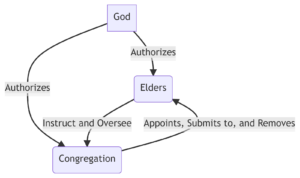Do Elders Receive Their Authority by Congregational Vote?
When Pope Leo III crowned the Frankish king Charlemagne on Christmas Day 800 A.D., he was introducing a novel rite into the ancient coronation ceremony. The question that soon developed was whether the Pope, by crowning Charlemagne, was conferring divine authority upon him, thus making his rule legitimate, or simply performing a ceremonial act that recognized Charlemagne as God’s duly appointed king.
In other words, where did Charlemagne’s authority come from? From God or the Pope? The implications of this question are massive and became the source of a conflict between church and state over the next four hundred years in the West.¹
Similar questions can emerge over the role of the congregation in recognizing elders. Is the congregation, by affirming an elder through congregational vote, conferring authority upon him or simply recognizing him as a God-given gift to the congregation?
In this article, I want to clarify that the mechanism of affirming elders (congregational vote) is not to be understood as the source of the elders’ authority.
Although elders are recognized by the congregation through a vote, they do not derive their authority to teach and oversee from the congregation but from God. As Paul writes in Ephesians 4:11, pastors are “gifts” of Christ to the church. Or, as Paul tells the Ephesian elders in Acts 20:28, “The Holy Spirit has appointed you . . . as overseers.” Thus, the church submits to Christ by recognizing those elders as gifts through a congregational vote.
This is different from a democratic “consent-theory” of government where, according to classical liberalism, authority is delegated by the people to the government and continues only with their consent.² According to such a model, “Governments . . . deriv[e] their just powers from the consent of the governed” (U.S. Constitution).
The key word here is “derive.” Authority is derived from the people’s consent. If applied to the church, such a model would mean elder authority is derived from the congregation. It would look like the following, with God delegating power to the congregation, who in turn invest the elders with their authority.
This is further clarified by distinguishing between person and office. Elders do not have authority by nature of their person but by nature of their office. Here political parallels can be helpful. Joseph R. Biden has authority by virtue of the office he holds, not by anything intrinsic to his person. An election does not confer authority on the office of President; an election appoints a person to the office. Similarly, a congregational vote does not invest the office of elder with authority; it merely confers the office on a particular person.
As Jonathan Leeman writes, “To submit to a man is to submit to that man. But to submit to an office is to submit to the one who has established the office. This means to submit to an elder is to submit to God, because God has appointed him an elder. Any parent who has left children with a babysitter and come home to hear the babysitter tell them of their children’s bad behavior understands this dynamic quite well. The next morning, the parent will say to the child, ‘By disobeying the one I left in charge, you disobeyed me.’”4
Through that office, elders assume an authority they lacked before being recognized as an elder, which they will not possess should they cease to serve as an elder. The “vote,” then, is to be understood as an affirmation of a particular man as a gift of Christ to shepherd the church.
A more detailed diagram might look something like the following (see Figure 3).
God has authorized the congregation to affirm and submit to elders, who are authorized by God to instruct and oversee the congregation. If necessary, the congregation can remove elders. Both elders and the congregation directly receive that authority from God.
All of this is summarized well by Congregationalist theologian R. W. Dale:
Nor does the New Testament give us the impression that the authority of bishops, elders, pastors, was derived from the Church; or that their office was created by the Church. The Church determined what men should fill the office, but the office was instituted by Christ; the Church determined who should exercise the authority, but the authority came from Him.5
He continues:
In electing its officers the Church acts, not for itself, but for Christ. It appoints the men whom He has chosen, and it appoints them to exercise an authority which He has conferred.6
If an elder’s authority comes from God, then what’s exactly happening when the congregation “appoints” an elder? The appointment is the congregation’s recognition or affirmation that a prospective elder possesses the biblical qualifications found in 1 Tim. 3:1–7 and Titus 1:5–9. It is the acknowledgment, “This man is biblically qualified and evidently a gift of Christ to our church” (Eph. 4:11). By the same token, if the congregation understood a proposed elder to fail to meet the biblical qualifications, they should vote no.
To summarize, then, two things must happen for a man to possess the authority of an elder. The church must recognize or affirm him in that capacity, and God must authorize him.
CONCLUSION
In all of this, neither congregation nor the elders are sovereign or autonomous—both submit to Christ by exercising the authority that he has delegated to each. And when each part is working properly, the whole body grows so that it builds itself up in love.
For more see:
- How do elders relate to the authority of the congregation? https://www.9marks.org/answer/how-do-elders-relate-authority-congregation/
- Jonathan Leeman, Don’t Fire Your Church Members (B&H Publishing, 2016).
- R. W. Dale, A Manual of Congregational Principles (Congregational Union of England and Wales, 1892)
*****
[1] Brian Tierney, The Crisis of Church & State, 1050-1300: With Selected Documents (Prentice-Hall, 1964), 17-18.
[2] For instance, Hobbes writes, “For it is evident . . . that the Right of all Sovereigns, is derived originally from the consent of every one of those that are to be governed” (Leviathan, 3.42).
[3] Francis McLean seems to articulate a ‘consent-theory’ model when he wrote in his annual letter as church clerk of the Metropolitan Baptist Church in 1885, “It is a well known fundamental principle of our National government that its laws derive their force by consent of the governed. The majority constitute the sovereign power. Any other basic forms bring about revolution. In our case it has been revolution.” Clerk’s Annual Report, January 1, 1885, MS-1582, Box 6, Folder 05. Reports 1874-1913. CHBC Archives, Washington D.C. At the same time, Metropolitan’s next pastor, William H. Young, claimed that as the only recognized elder, in his capacity of pastor, he possessed “unquestioned” authority over the congregation, writing to them upon accepting the office of pastor in 1885, “[A]s Pastor, I have a unique position, different from any other member of the Church. Your votes have placed me as the sole and supreme head of the entire religious workings of the church, without any exception whatever. This gives me an authority, that is unquestioned, inasmuch as it is accorded me by your deliberate and untrammeled election. In this official capacity, as Pastor, my directions and decisions are no longer my own but yours, since I represent the church, and not myself. In all affairs of church government I am the sole executive, and my decisions, while open to suggestions are to be carried out promptly and sincerely, or else I must be invited to relinquish my position, which I will promptly do when such facts ever make themselves seen.” Letter of William H. Young to Metropolitan Baptist Church, December 16, 1885, MS-1090, Box 5, Folder 04. William H. Young. CHBC Archives, Washington D.C.
[4] Jonathan Leeman, Don’t Fire Your Church Members. (B&H Publishing, 2016).
[5] R. W. Dale, A Manual of Congregational Principles (Congregational Union of England and Wales, 1892), 99.
[6] Dale, 100.











